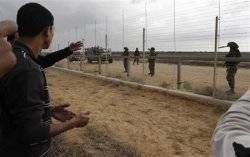Gaza residents say that Israel has eased some border restrictions as part of its ceasefire with the Palestinian territory's Hamas rulers, allowing farmers to visit land near its security fence and letting fishermen head further out to sea.
The Egyptian-brokered truce ended eight days of cross-border fighting that claimed 166 Palestinian and six Israeli lives, according to health officials.
As part of the deal, Israel and Hamas are now to negotiate a further easing of the Gaza border blockade, first imposed by Israel and Egypt after the Hamas takeover of Gaza in 2007.
Also on Saturday, tens of thousands of Gaza children returned to school for the first time since fighting ended late Wednesday. About half of Gaza's 1.6 million people are children.
In 245 UN-run schools, the day was dedicated to letting children share what they experienced, in hopes of helping them deal with trauma, educators said.
Thirty-four children and minors under the age of 18 were among those killed in the fighting, according to Gaza health officials and local human rights groups.
Better catch
In another development, fishermen were able on Saturday to sail six nautical miles, or 6.9km, out to sea, or double the previous limit, Mahfouz Kabariti, head of the local fishermen's association, said.
He said several fishermen already made the journey on Saturday.
"This is an opportunity and a chance for a better catch, though it is still a limited area," said Kabariti, who represents about 3,500 fishermen.
Israeli navy boats have been violently enforcing a sea blockade as part of the isolation of the Gaza Strip.
It has restricted the movement of Gaza's fishermen and farmers in border areas, citing security concerns.
The restrictions on fishermen have fluctuated over the years, linked to the ups and downs in Israeli-Palestinian relations.
The terms of the 1993 Oslo agreement stipulated for a fishing zone of 20 nautical miles from Gaza's shore.
Some Gaza residents said they were able to enter an Israeli-enforced buffer zone on the Gaza side of the border on Saturday with Israel without being fired upon.
Israel's military carved out a 300-metre-wide zone for several years, saying it was to prevent Palestinians from sneaking into Israel.
The zone occupied scarce acres of farmland in one of the most densely populated areas in the world.
On Friday, hundreds of Palestinians surged toward the border fence, but Israeli soldiers fired to push them back, killing one man and wounding at least 19 people.
Nidal Abu Dakka, 42-year-old farmer, said on Saturday that soldiers stood and watched as he and others moved close to the fence.
Abu Dakka, speaking by phone, said he was inspecting his land, about 60 meters from the border, and planned to plant wheat and barley soon. In other border areas, residents said Hamas police kept them away from the fence.
An Israeli government spokesman said he was unaware restrictions had been eased. A defense official said the Israeli military was no longer enforcing the no-go zone, but reserved the right to act against suspicious people.
Both spoke on condition of anonymity because they were not allowed to discuss the issue with reporters.
Israeli demands
Israeli demands that Hamas halt weapons smuggling into Gaza, while Hamas seeks free movement for people and goods in and out of Gaza.
After the Hamas takeover in 2007, Israel and then-Egyptian President Hosni Mubarak sealed Gaza to isolate Hamas and make it harder for them to govern.
The restrictions have since been eased because of international pressure on Israel and because of regime change in Egypt.
Before the November 14 start of the fighting, Gaza received most of its consumer goods through an Israeli cargo crossing, while Israel banned virtually all exports and travel from Gaza, preventing the area's battered economy from bouncing back.
A total of 156 Palestinians were killed during the latest Gaza fighting and 10 died later of their wounds, they said.
The exchanges of fire were the bloodiest between Israel and Hamas in four years.
Israel said it launched the offensive to put an end to Gaza rocket fire on Israeli towns and that it reached its objectives.
Hamas claimed victory because Israel did not make good on threats to send ground troops into the territory, as it had done four years earlier.
Israel's air force carried out up to 1,500 raids on Hamas-linked targets, while Gaza fighters fired roughly the same number of rockets, including some targeting the cities of Tel Aviv and Jerusalem for the first time.
PHOTO CAPTION
A Palestinian looks at Israeli soldiers as they stand guard behind the fence between Israel and southern Gaza Strip November 23, 2012. REUTERS.
Aljazeera


 Home
Home Discover Islam
Discover Islam Quran Recitations
Quran Recitations Lectures
Lectures
 Fatwa
Fatwa Articles
Articles Fiqh
Fiqh E-Books
E-Books Boys & Girls
Boys & Girls  Ramadan
Ramadan Fatwa Audios
Fatwa Audios Month of Mercy
Month of Mercy Women
Women Eed Al- Fitr
Eed Al- Fitr Food Recipes
Food Recipes Videos
Videos

 Prayer Times
Prayer Times












